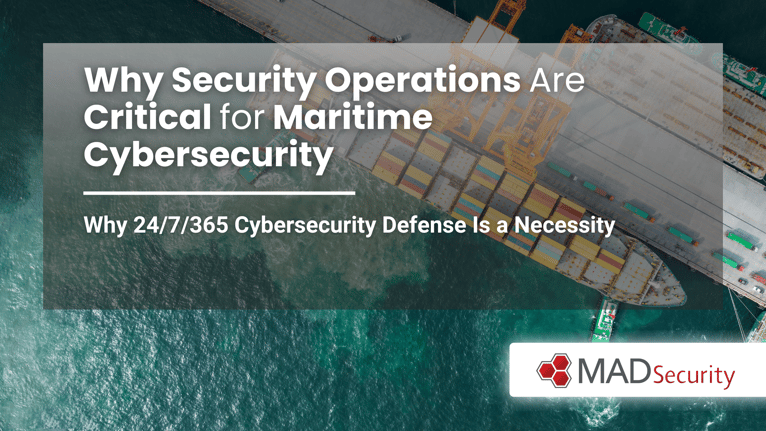
Security operations are an essential component of any effective cybersecurity program, especially for maritime organizations tied to critical infrastructure. Recently, state-sponsored cyber threats, such as the Volt Typhoon attack, have targeted critical infrastructure, raising concerns about the vulnerability of maritime and other essential sectors. As noted by DHS CISA:“U.S. authoring agencies have recently observed indications of Volt Typhoon actors maintaining access and footholds within some victim IT environments for at least five years.”
Five years of undetected cyber intrusion? How does this happen?
The answer lies in an overreliance on traditional perimeter defense strategies, which skilled adversaries will inevitably find a way to bypass. Furthermore, many organizations fail to regularly review logs for signs of living off the land (LOTL) techniques, which advanced actors, including nation-state cyber attackers, use to evade detection.
Why 24/7/365 Cybersecurity Defense Is a Necessity
.png?width=300&height=169&name=MAD%20SEC%20FT%20IMAGE%20-%20Why%20Security%20Operations%20Are%20Critical%20for%20Maritime%20Cybersecurity%20(1).png) Cybercriminals don’t take breaks, and neither should your defense. Continuous monitoring, detection, and response are essential to defending against the ever-increasing volume and sophistication of cyberattacks. This is evidenced by the threat sharing conducted by the MTS-ISAC. Defending critical systems requires not just tools but also skilled analysts capable of interpreting massive amounts of data and identifying potential threats in real-time.
Cybercriminals don’t take breaks, and neither should your defense. Continuous monitoring, detection, and response are essential to defending against the ever-increasing volume and sophistication of cyberattacks. This is evidenced by the threat sharing conducted by the MTS-ISAC. Defending critical systems requires not just tools but also skilled analysts capable of interpreting massive amounts of data and identifying potential threats in real-time.
A Maritime Security Operations Center (SOC) monitors, detects, and responds to threats. A great SOC goes beyond that by engaging in threat hunting and proactive log reviews, discovering threats that might otherwise go unnoticed—like finding a "needle in a pile of needles."
Technology Alone Won’t Solve Cybersecurity Challenges
Effective security operations are about more than just technology. Much like in carpentry, the skill of the people using the tools and the cybersecurity processes they follow makes the difference. Many organizations invest heavily in cybersecurity tools but lack the expertise to manage them effectively. When security fails, they often blame the technology—just as I might blame my golf club for a poor shot when it's user error.
Understanding the complexity of security operations and the expertise required is critical when deciding between building an in-house team or opting for outsourced managed security services.
Join Us for an Exclusive Cybersecurity Training in Houston
.png?width=300&height=169&name=MAD%20SEC%20FT%20IMAGE%20-%20Why%20Security%20Operations%20Are%20Critical%20for%20Maritime%20Cybersecurity%20(2).png) We invite you to join us for an exclusive cybersecurity training session in Houston, hosted in partnership with our Global Maritime Cyber Consortium. Whether you’re an experienced cybersecurity professional or new to the field, this event will offer invaluable insights into the pivotal role a Security Operations Center (SOC) plays in protecting digital assets and critical infrastructure.
We invite you to join us for an exclusive cybersecurity training session in Houston, hosted in partnership with our Global Maritime Cyber Consortium. Whether you’re an experienced cybersecurity professional or new to the field, this event will offer invaluable insights into the pivotal role a Security Operations Center (SOC) plays in protecting digital assets and critical infrastructure.
During this session, you’ll gain a comprehensive understanding of the core responsibilities of a SOC, which serves as the nerve center of an organization’s cybersecurity defenses. Through expert-led presentations, real-world case studies, and live demonstrations, you’ll learn how to leverage SOC tools, technologies, and methodologies to monitor, detect, and respond to cyber threats in real-time.
Key topics will include intrusion detection systems (IDS), SIEM (Security Information and Event Management) solutions, managed detection and response (MDR/EDR) tools, and threat intelligence feeds. You’ll learn how these tools empower SOC analysts to spot anomalies and stop potential breaches. Additionally, we will cover strategies for effectively communicating cybersecurity risks and incidents to senior leadership, ensuring they grasp the potential impact on the business.
Original Published Date: September 24, 2024
By: Maritime MAD Security

